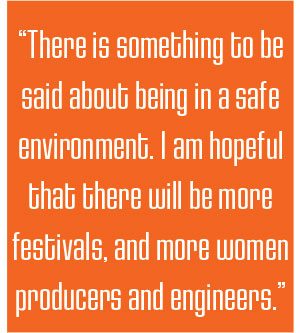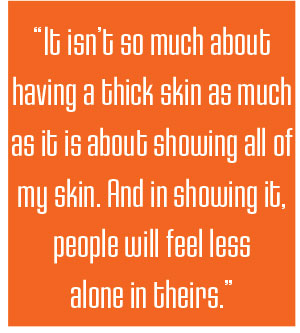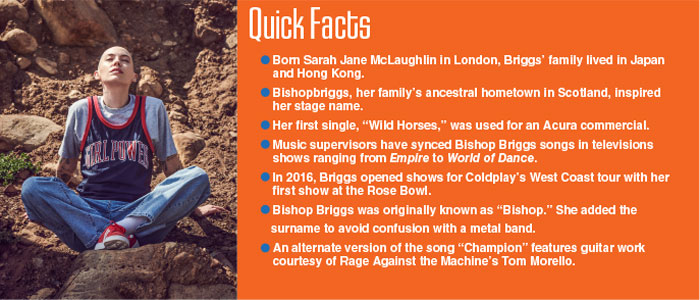Towering stages and immense audiences… having opened shows for Coldplay and Imagine Dragons, and having played the Panorama Festival in New York, Lollapalooza in Chicago and Coachella in California, Bishop Briggs is an artist who projects on a massive scale.
Born in London, and raised in Japan and China, Briggs enrolled at Musicians Institute in Hollywood, CA to study vocals. She played anywhere and everywhere in Los Angeles, her bravura vocals a dazzling calling card in listening rooms and coffeehouses as she defined her style with an ascent of willful self-creation.
One year after the release of her full-length debut, Church of Scars, Briggs returns with Champion, 10 songs that chronicle the breakdown of a devastating love affair. In conversation, Briggs is warm, open and expressive. MC caught up with her during a brief respite between her US and European tours.
Music Connection: The song “Champion,” the title track of your new project, is an empowering anthem, but the overall emotional arc of the songs in the collection is based on an equal measure of heartbreak. Having written these songs, is it necessary to live through the turmoil again when you perform them?
Bishop Briggs: Absolutely. It’s interesting with music, because meanings of songs can change over time. And I think with this album in particular, starting with the title track “Champion,” it was a song that was made because I was not feeling that way. I was not feeling like I was enough, and I was feeling insecure. And to walk out on stage and have this mantra with conviction, I have to say, “I am a champion.” I would say on the tour that it was so healing to be in a safe place and hopefully encourage others to know that they are enough, and there is power in positive affirmations, and trying. That’s really important.
MC: “Champion” starts with a very specific view. “Alone in my car, I’m in a parking lot, darkest spot in my mind/My tongue is dry, why do I crumble quickly, stumble swiftly?” but eventually it amps up with tremendous resolve.
Briggs: The verses were honing in on a particular moment in time, when I was sitting in a parking lot and reflecting, and feeling defeated. I think for this song to really be big enough to convince me that I am a champion; it had to be something bigger than myself. I hope people connect with it. It’s talking about you are a champion whether it be in the smallest way or the biggest way. Whatever way it means to you, you are enough––just your existence is enough to make you a champion. I hope it resonates.
MC: The song cycle begins with a prelude, “I Still Love You,” and ends with the unadorned demo “I Tried.” As we understand, the complete album was written in a two-week non-consecutive period of time, correct?
Briggs: Yes. It was truly an emotional purge. I had maybe two moments in the studio before I went to London. I was in LA when I wrote “Can You Hear Me Now” and “Champion.” The songs “Jekyll & Hide” and “I Tried” were actually written on the same day with my co-writer K. Flay. Then I went to the airport. I thought going to London, a place where I am originally from, and is filled with the albums that I reach for in going through heartache––Amy Winehouse and Adele.
And I had to leave LA. It was too painful to be there. I’m sure others can relate––when you are walking past the coffee shop where you went to with that person. I couldn’t bear it. So in London, at the first session, I wrote down “I Still Love You.” And that’s how it came about, and became the first song on the record.
 MC: And “I Tried” exists on the record in its one take form?
MC: And “I Tried” exists on the record in its one take form?
Briggs: Yes. It was truly an emotional purge. I wanted to end the album feeling completely bare––that there was nothing to hide behind. It’s about not hiding. I was also thinking about what would I do if I wasn’t afraid. A lot of fear lies in being completely vulnerable. Even on release day I had a lot of support and joy around me, but it was a really heavy day. This is everything I talk about in therapy and it’s now out into the world. And it was important to represent myself. In hindsight, to present myself as I am, which is flawed and multi-dimensional just as every human being is. It definitely feels like my skin is inside out.
MC: You’ve just completed a US tour and you’re heading to Europe. We heard that you had some health concerns, correct?
Briggs: I did have a brief stint of flu on the tour, it was a week and I think I caught it early enough. I was lucky I had a supportive crew and I was fortunate it didn’t affect my voice too much. I did a lot of vocal rest, and thankfully got back on my feet. Having this album be my most intimate yet, I feel like there is a closeness I feel with the people who are in front of me, and their warmth. I can go out there and be very honest to say, “I’m going to try my best and there may be parts where I will need their help singing along.” Some of my favorite shows were those. It gives you a chance to be human, and to be drinking tea onstage.
MC: Since you are signed to a major label, Island Records, is there a formal A&R process where you have to play new ideas for A&R at the company and have them approve of the direction of your projects?
Briggs: It’s interesting. I came back from London, and I had a moment with my A&R. Her name is Jackie Winkler. She was curious what I’d been up to. I very cautiously said, “These are some demos.” Because everything was written with such heartache, I almost didn’t have perspective. I wasn’t sure it was something I should release. I saw it as so cleansing, so healing, but so difficult. I think of Jackie as more of a friend and I wanted her to hear the demos. I played them for her and she said, ‘Well––you have an album.” And I was completely shocked, to say the least.
 MC: What was the journey from demo to final mix?
MC: What was the journey from demo to final mix?
Briggs: That’s when the process of trying my best not to touch the demos began. It was so important with the mixing process to keep everything as it was. Every decision during that time was made out of pureness that I wouldn’t be able to recreate. And it was the same with re-recording vocal, the imperfections and the pain––it’s important that they remain on it as it relates to the themes about not hiding.
MC: You referenced your collaborator K. Flay. Teddy Geiger is also present. What was the nature of their contributions?
Briggs: Teddy was part of “Someone Else.” With this album it was really important to work with people where it was a safe place to be vulnerable, to cry, to be honest. I wanted to work exclusively with feminists, those who believe in the power of vulnerability and accepting other ideas in the room. Producers, keyboard players, background singers and gospel vocalists who could enhance the truth.
MC: Feminism in the music business; these are new times indeed.
Briggs: I hope so. I think there is so much work to be done. The #MeToo movement was so triggering and eye-opening. It made room for people and shined a light on those that were negatively affecting other people’s lives. I am very thankful for that. There is something to be said about being in a safe environment. I am hopeful that there will be more festivals, and more women producers and engineers.
MC: Your shaved head is a new visual image and represents a striking transformation.
Briggs: I did it for my friend Arax who was diagnosed with breast cancer and had to shave her head before starting chemo and in the midst of it as well. I thought that this was a way that I could show my support for her, while also promoting the organization she believes in, The Susan B. Komen foundation. I like it because it gives me an opportunity to talk about her, but also I’ve never felt more like myself. When I saw a little of the shaved head for the first time I felt completely at ease, like I was looking in the mirror at the person I have always been. It was a very eye-opening experience. And I was that 14-year-old who was begging her mum to let her shave her head. My mum is still wrapping her head around it. But here we are.
MC: After maintaining the emotional vulnerability that is key to writing and recording Champion, do you have to shift gears in touring and promoting, or dealing with social media opinions?
Briggs: It really is about tapping into different headspaces. The moments when you have to have a thick skin are in regards to feedback online from someone on Twitter, who is maybe not as kind as you would wish. It feels like skin isn’t even there when you’re writing a song. I tend to go into the headspace of “no one will hear this.” I’ve never seen it about having thick skin. I think of remarks that hurt or a press environment that doesn’t feel super comfortable.
In terms of songwriting and releasing music, it feels like such a soul thing for me—my purpose to connect with other human beings. It isn’t so much about having a thick skin as much as it is about showing all of my skin. And in showing it, people will feel less alone in theirs.

MC: Your sister, Kate McLaughlin, manages you. How does this partnership of sisters work?
Briggs: It is a total partnership, and I feel so incredibly thankful for that. I get to work with someone who not only knows me so well, but also is completely overqualified for the job, lucky for me. When all of this exciting stuff started happening she quit her job and came to LA and we’ve been working together for several years now, and we haven’t looked backed.
MC: We note that you had a recent performance on the Jimmy Kimmel Live! If you sang loudly enough, they could probably have heard you just across the street at your alma mater, Musicians Institute.
Briggs: It’s so full cycle. The most full cycle was when I recently played the Wiltern Theater in Los Angeles, because that’s where I had my graduation ceremony for MI. Alice Cooper was our keynote speaker. I wasn’t asked to perform—not that I’m bitter—and I didn’t win any awards. For my final project I sang “Piece of My Heart” by Janis Joplin. I’m very grateful to that school. To be able to sing every single day is such a gift.
MC: How far ahead is your life planned?
Briggs: I will say I read an incredible Taylor Swift interview where she was asked about a five or 10-year plan and she explained that since tomorrow isn’t guaranteed it’s important to live in the present, and to not assume that you are going to have five or 10 years because you don’t know. I thought that was beautiful. When I have moments on stage it’s as if time has completely halted. As a person who is a fan of goals, I will say that venturing into the New Year, and as I get older, I feel there is more power to stay in the moment rather than thinking too far ahead or dwelling in the past. I’m doing that a lot more.
Contact Erika.Clark@umusic.co












